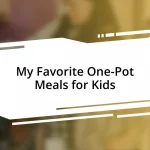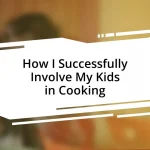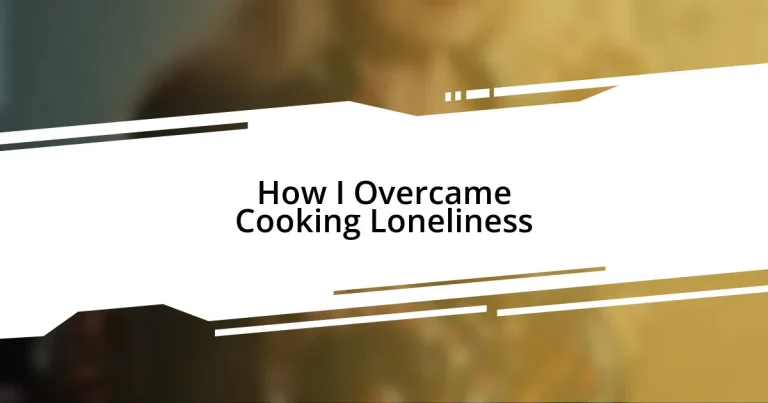Key takeaways:
- Cooking loneliness stems from a lack of social connections and can transform cooking into a reminder of solitude.
- Identifying specific cooking challenges such as time management, lack of inspiration, and skill level is crucial for overcoming feelings of isolation.
- Building a consistent cooking routine and inviting others to cook can turn solitary cooking into enjoyable, communal experiences.
- Engaging with community cooking events, classes, and online groups fosters relationships and creativity, making cooking a shared passion rather than a lonely task.
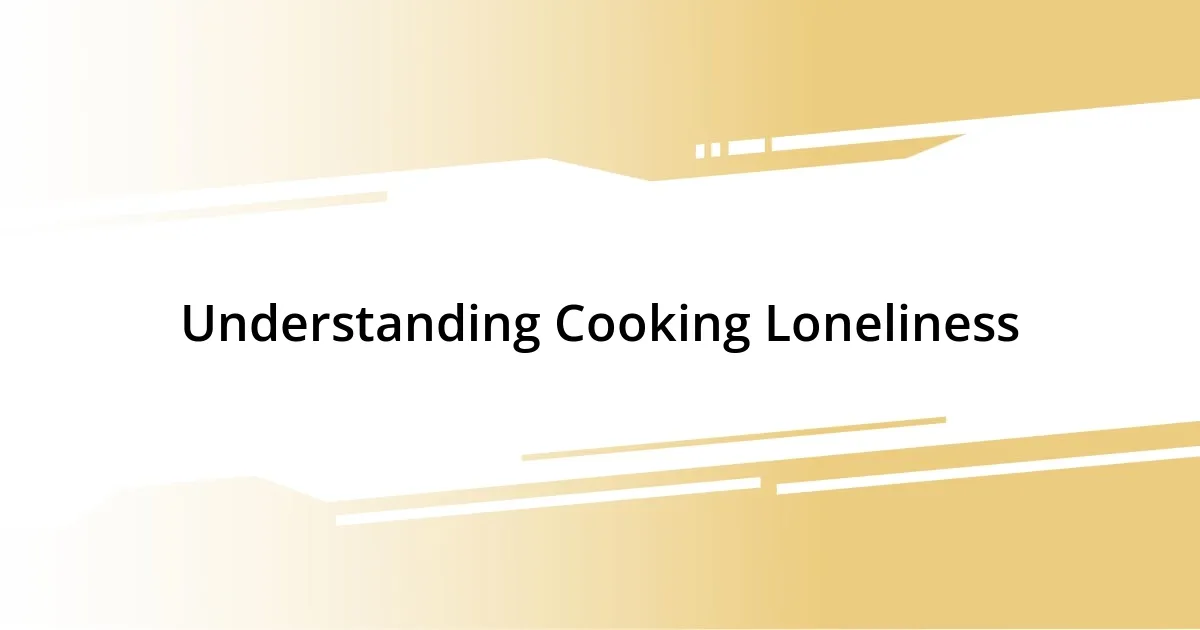
Understanding Cooking Loneliness
Cooking loneliness can feel like a shadow lurking over your kitchen, making even the most vibrant recipes seem dull. I remember one evening, I stood by the stove, stirring a pot of pasta, and just felt the weight of silence pressing down. It dawned on me—what’s the point of a feast if there’s no one to share it with?
I often found myself scrolling through social media, watching friends post joyful dinner gatherings while my own table remained empty. This contrast made me question my relationship with food. Why did cooking, which can be such a communal activity, sometimes evoke feelings of isolation? I realized it’s not just about the food; it’s about the connections and memories that accompany those meals.
Each dish I prepared felt like an echo of laughter or conversation I wished was there. I began to understand that cooking alone could sometimes amplify feelings of disconnection, turning a simple act of nourishment into a reminder of solitude. How could a bowl of soup feel so heavy when it was meant to be comforting? This was the paradox I had to confront in my journey to overcome cooking loneliness.

Identifying Your Cooking Challenges
Identifying the specific challenges you face in cooking is the first step toward overcoming the feelings of loneliness that may accompany it. For me, finding the time to cook was often tricky. I juggled work, commitments, and the constant temptation of takeout. I sometimes abandoned my kitchen adventures because preparing a meal just felt like one more task on my endless to-do list.
Another challenge can be the lack of inspiration. I recall those days when my fridge was full of ingredients, but nothing seemed appetizing. I’d stare blankly at what I had and succumb to the discouraging thought, “Why bother?” That moment is crucial to recognize; it’s not just about having ingredients—it’s about having the motivation and creativity to bring them to life.
Then there’s the aspect of skill. I remember the first time I tried to make a complicated recipe and ended up frustrated with burnt edges and bland flavors. That feeling of inadequacy can be disheartening, making you question your abilities. It’s important to identify these feelings and understand that they are part of many cooks’ journeys, not just yours.
| Challenge Type | Description |
|---|---|
| Time Management | Struggling to find the time amidst a busy schedule, leading to reliance on quick but less fulfilling meals. |
| Lack of Inspiration | Feeling uninspired despite having ingredients, resulting in decreased motivation to cook. |
| Skill Level | Facing frustration with cooking techniques or recipes that feel beyond one’s current abilities. |
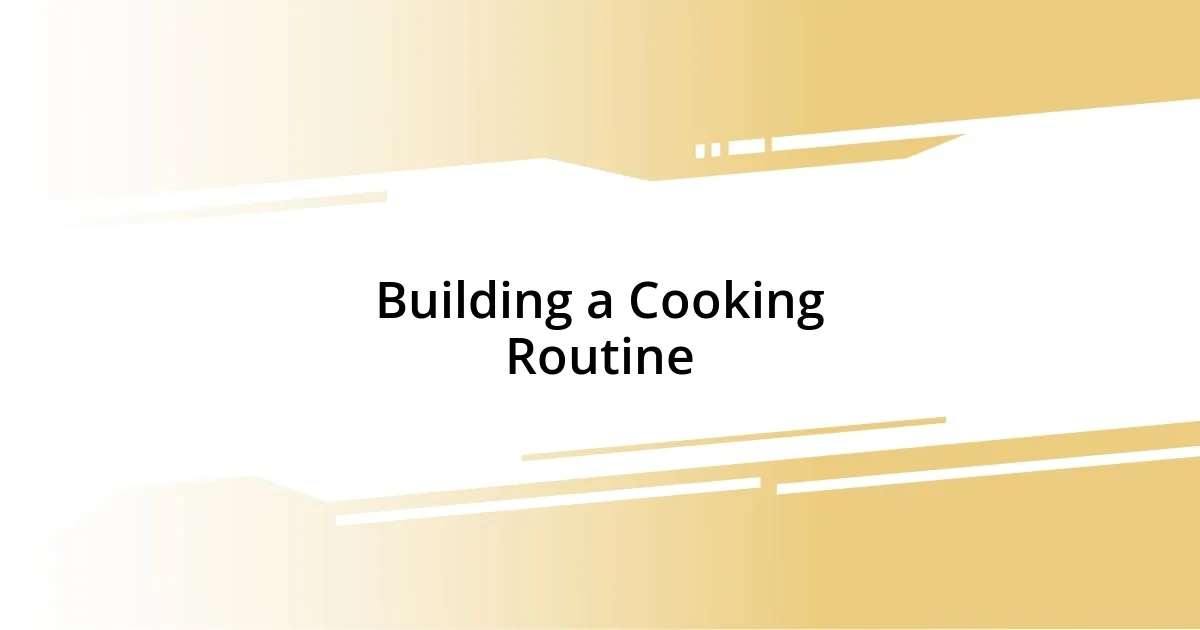
Building a Cooking Routine
Building a cooking routine became my secret weapon against the feelings of loneliness I often felt in the kitchen. I found that creating a schedule transformed cooking from a daunting task into an enjoyable ritual. For me, Sunday afternoons turned into a time for meal prep, where I would pour my favorite playlist and chop veggies while letting music fill the silence. There was something uplifting about the anticipation of the week ahead, having wholesome meals ready to grab and go.
To help you establish your own cooking routine, consider these steps:
- Set a Consistent Cooking Day: Choose a day each week dedicated to cooking or meal prep, making it part of your schedule.
- Create a Recipe Bank: Gather recipes that excite you and keep them handy. This makes it easier to decide what to cook and keeps your meals varied.
- Practice Mindful Cooking: Enjoy the process—really engage with the colors, smells, and flavors. This can turn cooking into a creative outlet rather than a chore.
- Invite Others: Occasionally, invite friends or family to join you. Cooking together can lighten the mood and make it a shared experience, which helps combat loneliness.
- Stay Flexible: Things don’t always go as planned. If you’re not feeling it one night, that’s okay! Flexibility ensures cooking remains a joyful experience, not a burden.
Experimenting with this routine not only made me feel more connected to my meals but also to the creative joy of cooking itself. It can be a small adjustment, yet it has the potential to change your entire kitchen experience.
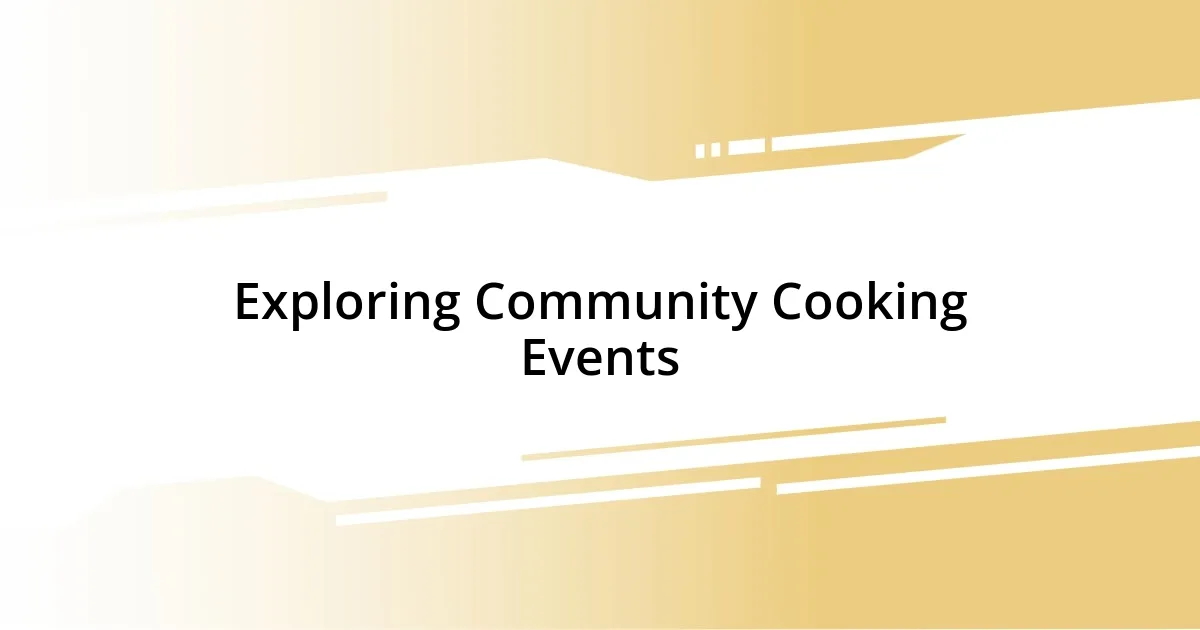
Exploring Community Cooking Events
Attending community cooking events was a game changer for me. I remember walking into my first one feeling a bit nervous but equally excited. The atmosphere buzzed with conversation and laughter, which felt so uplifting compared to my usual solitary cooking sessions. I quickly realized that cooking together not only eased my feelings of isolation but also sparked creative ideas from others’ cooking styles.
What I found fascinating was the variety of food I was introduced to at these events. One night, I learned how to make authentic paella from a seasoned cook who shared stories of his family gatherings around the dish. The vibrant colors and aromas filled the room, and I felt a sense of connectivity that I’d never experienced in my kitchen before. The social exchange ignited a passion within me—I wondered, “What other cuisines am I missing out on?”
Each event allowed me to meet new people and build friendships over shared meals. One memorable evening, I teamed up with a stranger who later became a close friend. We bonded over our culinary mishaps while attempting to bake the perfect soufflé. These moments reminded me that cooking can be so much more than just food; it’s a way to cultivate relationships and build community, transforming lonely kitchens into vibrant spaces of celebration and connection.
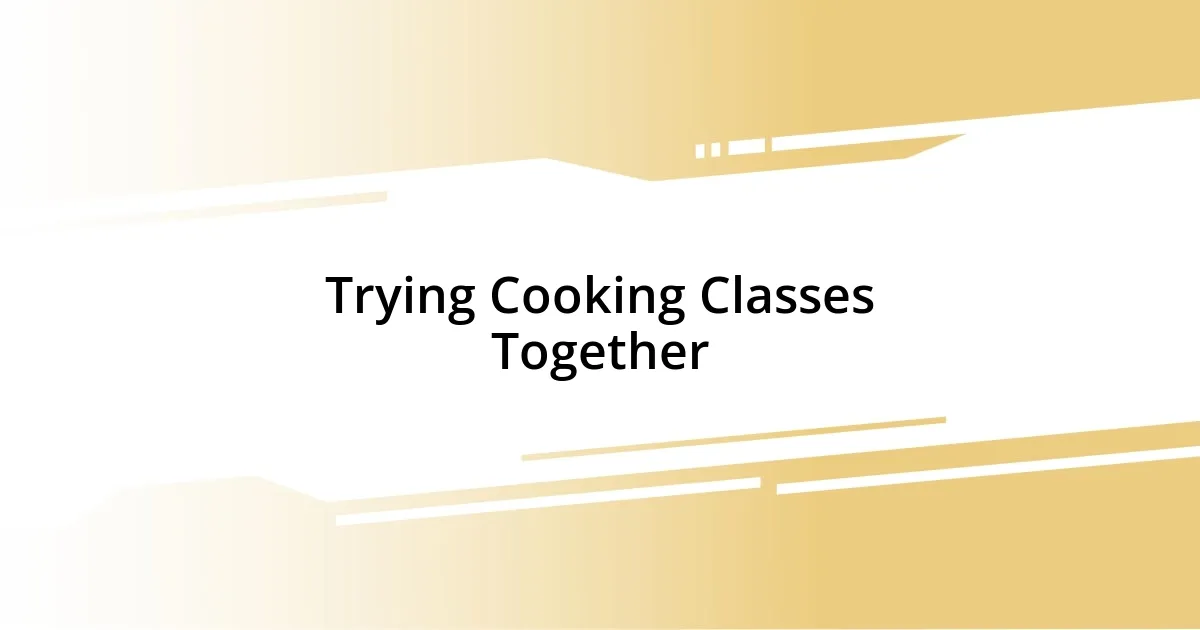
Trying Cooking Classes Together
When my friend and I decided to try a cooking class together, I had no idea how much fun it would be. We laughed our way through our first attempt at homemade pasta, and believe me, there were more flour clouds than culinary masterpieces! That shared clumsiness transformed what could have been just another mundane evening into a memorable adventure, filled with inside jokes and playful competition.
What really surprised me was how cooking alongside someone else made every step feel more rewarding. As we fumbled with ingredients, I found comfort in the fact that we were both learning together. It was like going back to school but with delicious outcomes! Sharing the experience of the class sparked conversations about food culture, traditions, and cooking tips that we never would have discussed otherwise. Have you ever felt that thrill when you tackle something new with a friend? It creates a bond that goes beyond just cooking.
We also discovered that cooking classes offered opportunities to meet others who shared our interests. One evening, we connected with a lovely couple who had also taken the plunge into the culinary world. We ended up swapping recipes and planning future cooking nights, which further enriched our social circle. I’ve learned that sharing the kitchen not only fills your stomach but also your heart, turning solitary cooking into warm, communal experiences.

Finding Online Cooking Groups
Finding online cooking groups was another remarkable step in overcoming my cooking loneliness. One afternoon, I stumbled upon a Facebook group dedicated to home cooks who share their culinary experiments. The excitement of seeing everyone’s creations made me realize I wasn’t alone in my passion. Have you ever felt inspired by others’ cooking adventures? I certainly have. Their posts sparked ideas in me and encouraged me to share my own dishes, which felt like inviting friends into my kitchen.
As I engaged with the group, I also got involved in virtual cooking challenges. One month, we all attempted to replicate a popular dish from various cuisines. It was delightful to scroll through the photos—not just of food but of stories behind each dish. My heart swelled as I shared my version of sushi and learned why a fellow cook’s family recipe meant so much to them. These interactions reminded me that cooking transcends the kitchen; it’s about culture, heritage, and connection.
Joining a cooking forum has also opened the door to online workshops where chefs share their expertise. I vividly recall a session focused on bread-making, and it felt as if the instructor was there guiding me, despite being miles apart. The thrill of kneading the dough while chatting with fellow bakers made my kitchen feel lively, almost as if I was cooking with friends. The sense of community really struck me—when was the last time your cooking felt as inspiring as a group adventure? Knowing that others were on the same journey helped ease any lingering feelings of loneliness.
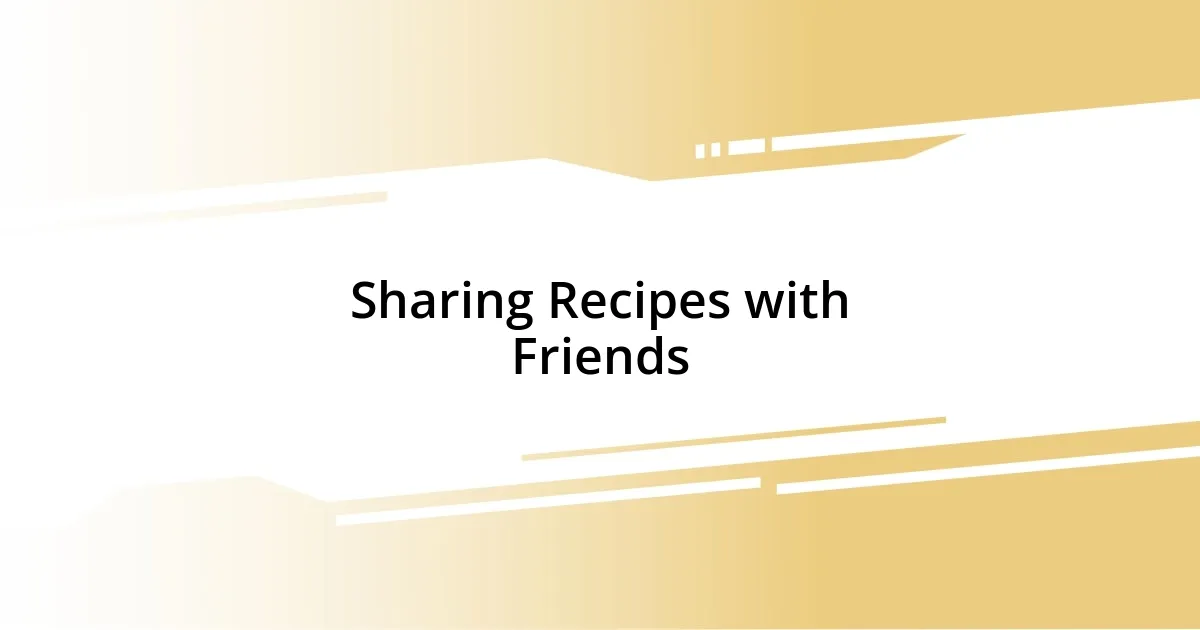
Sharing Recipes with Friends
There’s something incredibly heartwarming about sharing recipes with friends. I remember one particular evening when I gathered my closest pals for a potluck dinner. As we traded recipes and tasted each other’s dishes, laughter echoed through my kitchen, mingling with the delicious scents wafting from the oven. Have you ever felt a sense of joy just from seeing the smile on a friend’s face when they try a dish you made? That night, I realized that food could be a bridge, connecting us in ways that words sometimes couldn’t.
As we swapped our favorite recipes, it was fascinating to see how each person put their unique spin on traditional meals. A simple lasagna became a discussion topic—did we prefer béchamel or ricotta? This exchange ignited a friendly debate that lasted far beyond the dinner table. I found it inspired creativity in my own cooking as well. Every time I tried a recipe from a friend, it felt like I was invited into their culinary world. Isn’t it amazing how sharing a recipe can open your kitchen to someone else’s story and heritage?
One of my favorite moments occurred when a friend shared her grandmother’s secret chocolate chip cookie recipe. I could feel the pride in her voice as she explained each step and the memories tied to it. So, I made it a point to host a baking night where we could recreate those cookies together. The room filled with warmth—not just from the oven but from the joy of crafting a meaningful recipe. Why does sharing a dish with loved ones make everything taste better? I believe it’s the love, laughter, and togetherness that add the most flavor.


